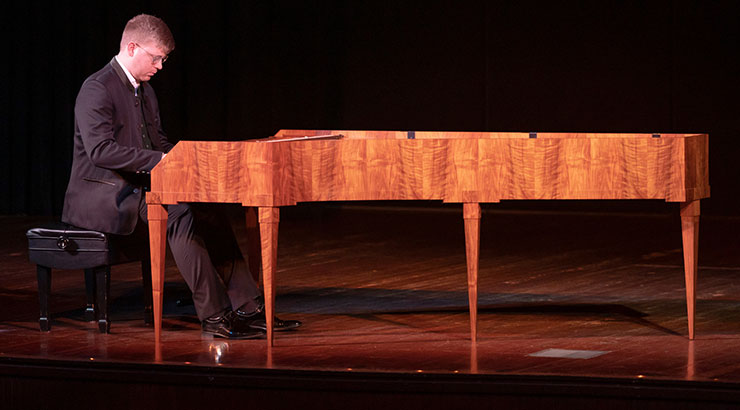Fortepianist Daniel Maltz to join KU Orchestra for The True Sound of Haydn

By Susan L. Peña
KUTZTOWN, Pa. – Lovers of classical music will have a rare chance to hear Joseph Haydn’s Keyboard Concerto in D minor as his contemporaries would have heard it 7:30 p.m. Thursday, Nov. 7, Schaeffer Auditorium. The program, part of the KU Presents! series, will feature fortepianist Daniel Maltz and the KU Orchestra in the Haydn work, as well as solo works by Mozart and Beethoven.
Tickets for Daniel Adam Maltz are $35; $31 for students and seniors and can be purchased at the KU Presents! website or by calling the KU Presents! Box Office 11 a.m. to 3 p.m. Tuesday through Thursday, at 610-683-4092. Established to be the center of cultural life at Kutztown University, KU Presents! serves the campus and community by bringing world-class live arts that entertain, educate and enrich.
Most audiences have only heard modern pianos in live concerts, whether the pianist is performing J.S. Bach, Mozart, Beethoven, Brahms or Rachmaninoff. But the pianos of the mid-1700s to mid-1800s, called “fortepianos,” were still in the early stages of their evolution, as makers tried various ways of constructing their instruments, often with input from composers and performers of that time. The early pianos were made entirely of wood (no cast iron), so they were considerably lighter and more delicate in sound, and they had fewer keys than modern pianos.
Maltz, an American who has lived in Vienna, Austria, for the past decade, began his career as a modern pianist who was powerfully drawn to the music of Haydn, Mozart, Beethoven and other composers of that period. He moved to Vienna, he said, “to be close to the music I love by experiencing the places important to those composers and by immersing myself in the culture, art and philosophy of that time so I could make myself a better vessel for that music.”
When he began studying at the University for Music and Performing Arts in Vienna, he had the opportunity to take a course on historical keyboard instruments with a specialist in that subject. At first, he was only interested in becoming “the best-informed modern pianist for that period,” but after playing on the university’s original 1805 Rosenberger fortepiano, “it became so clear that that was exactly how I would express this music.”
After that experience, which he called “life-changing,” he never looked back. As he grew in expertise, Maltz became one of the few people allowed to play on the original instruments in the Collection of Historic Musical Instruments in the Kunsthistorisches Museum in Vienna. “Those instruments absolutely want to talk to us,” he said, “but they’re old. So you have to read between the lines to learn what they want to tell us. There’s no way to tell exactly how they sounded back then.”
Maltz, now considered one of the foremost fortepianists in the world, performs on a perfect replica of a 1792 Anton Walter fortepiano (Beethoven owned one and highly praised it). Instead of the three pedals controlled by the feet in modern pianos, this instrument has two knee levers just under the keyboard. One of them is a damper pedal, and the other, called the “moderator,” transforms the sound to a beautiful, otherworldly voice that has no modern equivalent. Composers did not indicate in their scores when to use this change of color, leaving it up to the performer to make that decision.
Maltz – who has also studied at the Royal Academy of Music in London, as well as privately with Andreas Staier and Ingomar Rainer – said that living in Vienna has allowed him to acquire “a much richer insight into the music, because you’re not hearing it in a vacuum. Learning the history, the philosophy, all that makes you more prepared to interpret that music. To me it’s the most important part of my interpretations.”
And because Vienna was the center of the classical world, Maltz has access to all the carefully preserved historic sites associated with these composers. He has even had the opportunity to perform in the Palais Lobkowitz, in what is now called the Eroica Hall, where Beethoven premiered his Symphony No. 3. This was the magnificent home of one of his most important patrons, Prince Joseph Lobkowitz.
For all these reasons, Maltz expects to stay in this City of Dreams, where he has made a home with his partner and where he enjoys sitting in cafes, attending operas and enjoying Viennese pastries when he is not touring. He also hosts a podcast, “Classical Cake,” featuring interviews about various aspects of Viennese music and culture (they can be viewed on https://www.danieladammaltz.com).






